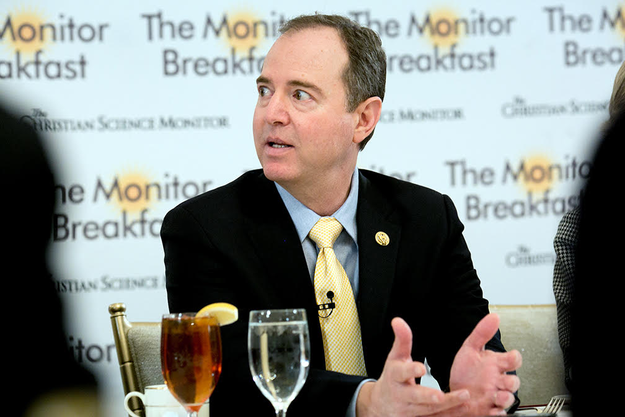
Rep. Adam Schiff
Michael Bonfigli/The Christian Science Monitor
The FBI and the Department of Justice have raised extensive objections to the release of a Democratic response to a Republican-written memo that criticized the FBI’s Russia investigation, the top Democrat on the House Intelligence Committee said Wednesday, dampening prospects that the rebuttal will ever see the light of day.
Rep. Adam Schiff, a California Democrat, said officials of the two agencies had “identified everything in the memo that wasn’t already public” as objectionable. Schiff said Democrats were negotiating with officials in an effort to persuade them that much of the information contained in the memo should be made public. But he was uncertain those negotiations would be successful.
“What I don’t know is what authority the FBI and DOJ have been given” by the White House to negotiate the memo’s release, he said during a breakfast meeting with reporters. “In other words, when we reach agreement with the FBI, is that the end of the matter? Or will the White House still put a veto on it?”
The House Intelligence Committee, which is dominated by Republicans, voted unanimously last week to send the decision to release the Democratic memo to President Donald Trump, but the White House on Friday refused, citing FBI and Justice Department objections. Schiff’s comments were the first to quantify how deeply the Democratic memo might have to be censored before the White House would agree to its release.
The Democratic memo purports to rebut a Republican memo released the week prior that criticized the FBI’s application for a secret warrant to monitor the communications of former Trump campaign adviser Carter Page. The White House approved the Republican memo’s release, despite strenuous objections from the Justice Department and FBI.
Schiff said much of the material in the Democratic memo came directly from FBI applications to monitor Page’s activities, including applications for renewal of the original warrant. Those later applications would have included the results of the earlier monitoring. Under law, a warrant must be renewed every 90 days, and the application for renewal must demonstrate that the previous monitoring had been fruitful.
Schiff declined, however, to provide a percentage for how much information in his memo had been drawn from the original warrant application and how much came from the requests for renewal. The FBI originally was granted authority to monitor Page’s communications on Oct. 21, 2016, after he had left the Trump campaign. The authority was renewed three separate times, according to the Republican-drafted memo that the committee released on Feb. 2.
The FBI, in a rare public statement, had said that “material omissions of fact…fundamentally impact the memo’s accuracy.”
“The FBI has taken no issue with the accuracy of the memo,” Schiff said of the Democratic response. He said the additional information in the Democratic memo was needed to correct inaccurate impressions the Republican memo had created.
But the FBI is insisting that the new information in the memo remains classified, even though, Schiff said, much of it already is known to the public through court records and other accounts. “In our view, a lot of it is already in the public domain,” Schiff said. “The question is what should be declassified.”
The battle over the competing memos has become a central debate in the ongoing probe of Russian meddling in the 2016 presidential election and possible collusion by Trump campaign officials. Republicans have argued that their memo shows that the FBI’s investigation into possible collusion was improperly influenced by information contained in a dossier that was assembled as opposition research by a firm that was being paid by the campaign of Hillary Clinton.
That contention is generally undercut by the Republican memo itself, which concedes that the Trump-Russia investigation began months before the FBI sought to monitor Page and stemmed from the activities of another Trump adviser, George Papadopoulos, who pleaded guilty in October to lying to the FBI about his role with the Trump campaign. Papadopoulos is cooperating with special counsel Robert Mueller’s investigation.
Schiff said he is amenable to redacting any information from the Democratic memo that would reveal how the FBI collected the information and from whom. “What I would like from the FBI, I can tell you, is to be able to agree on any redactions that are necessary to protect sources and methods,” he said. “Then at least the public will have visibility that if the White House still refuses to publish the document, they can no longer try to hide behind anyone else.”




